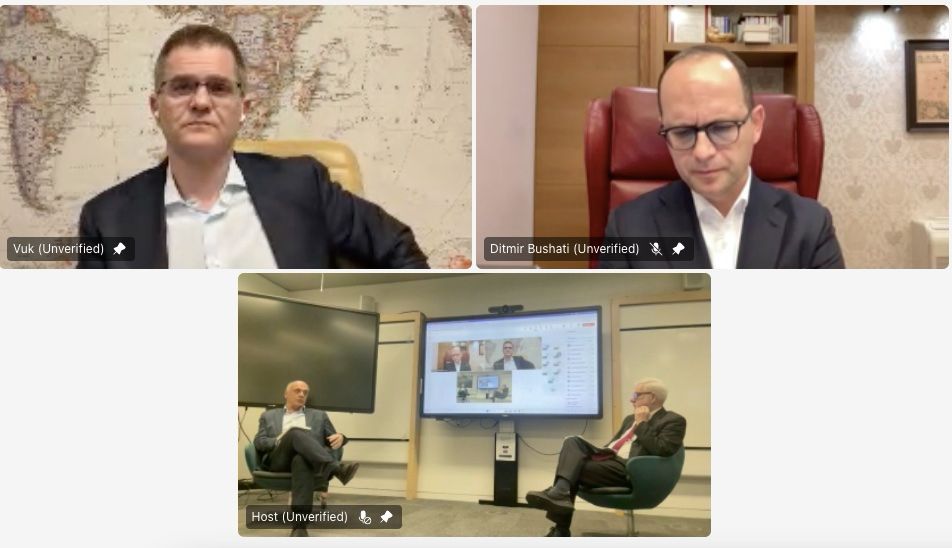European Russophobia and Europe’s Rejection of Peace: A Two-Century Failure
Europe has repeatedly rejected peace with Russia at moments when a negotiated settlement was available, and those rejections have proven profoundly self-defeating. Read more

President of the Center for International Relations and Sustainable Development (CIRSD), Vuk Jeremić, took part in a panel discussion organized by Oxford University on the future of EU enlargement, where he delivered a critical analysis of the European Union’s current approach to the Western Balkans. He argued that the promise of accession is no longer credible and called for a new, pragmatic framework for regional integration.
The panel, chaired by Dr. Othon Anastasakis, Director of South East European Studies at Oxford (SEESOX), featured distinguished speakers, including former Polish Foreign Minister Jacek Czaputowicz and former Albanian Foreign Minister Ditmir Bushati. The discussion focused on the challenges facing the EU’s enlargement policy and explored potential alternatives for deeper European engagement with the Western Balkans and Eastern Europe.
“The EU’s Enlargement Narrative is Close to Bankrupt”
In his remarks, Jeremić did not mince words, asserting that the EU’s current enlargement strategy has lost credibility and is failing to inspire confidence in the Western Balkans. He noted that in Serbia, even among intellectual and political elites, few believe that EU membership is a realistic prospect under current institutional conditions.
“The value of the EU’s narrative and official policy regarding the Balkans is close to bankrupt,” Jeremić said. “Very few people in Serbia—whether in government, business, academia, or civil society—truly believe that we are on a real path to accession. The only way that could change is if the EU undergoes a fundamental transformation. But that is not likely in the foreseeable future.”
Jeremić pointed to the Lisbon Treaty as a key obstacle, explaining that as long as its current provisions remain in force, any new EU member state would automatically receive a seat at the European Council with national veto power—a scenario that is politically inconceivable for existing EU members.
“For as long as the Lisbon Treaty remains unchanged, there is a snowball’s chance in hell that any Western Balkan country will be admitted. Any treaty reform would require unanimous consensus among EU leaders—something that is increasingly rare in today’s political climate,” he said.
A Call for Pragmatism: Economic Integration Over Empty Promises
Rather than perpetuating an “empty illusion” of membership, Jeremić called for a shift toward a more achievable and interest-driven framework of engagement between the Western Balkans and the EU. He specifically proposed integrating the region into the European Economic Area (EEA)—a model that has successfully included countries like Norway, Switzerland, and Liechtenstein.
“This is not about giving up on Europe—it is about acknowledging reality and pursuing what is actually possible,” Jeremić explained. “Joining the EEA would provide economic benefits, stability, and a clear structure for cooperation, without the political impasse that full accession would require. It would allow for reforms to continue without misleading our citizens with false promises of EU membership.”
Jeremić noted that the EU has a responsibility to be honest about the limits of its enlargement strategy. Continuing to promise something that is not going to happen, he warned, is causing long-term damage to the EU’s credibility—both in the Western Balkans and beyond.
“For every day that Brussels bureaucrats, led by Ursula von der Leyen, continue to insist that Serbia and the region are on a genuine path to EU membership, when everyone involved knows this is not a serious consideration, public support for Europe erodes further. This isn’t just a problem for us—it’s a problem for the EU itself,” he warned.
Lessons from the Balkans for Ukraine and the Eastern Partnership
Expanding his argument beyond the Western Balkans, Jeremić cautioned that the EU’s failure to deliver on enlargement should serve as a warning for countries in the Eastern Partnership, particularly Ukraine. He drew a direct comparison between Serbia’s lost faith in EU accession and the potential disillusionment of Ukrainians in the years to come.
“In Serbia, we once had overwhelming support for EU membership. Over time, that hope was slowly eroded. The same thing will happen in Ukraine and other Eastern Partnership countries if the EU continues making promises it cannot keep,” Jeremić stated.
He noted that Ukraine’s potential membership is far more politically and economically complicated than that of the Western Balkans. Security concerns with Russia, Ukraine’s sheer size, and its status as an agricultural powerhouse make full EU membership highly unlikely. He pointed out that if Ukraine were ever to join, it would become the largest recipient of EU structural funds, causing a significant redistribution of financial resources that would face strong resistance from existing member states, particularly from farmers in France, Poland, and the Netherlands.
“The best way to lose Ukraine’s support for European integration is to keep misleading them about a full-fledged EU membership that is simply not going to happen,” Jeremić warned. “We saw this dynamic unfold in the Balkans—it will be even more dangerous if it happens in Ukraine, given the much higher geopolitical stakes.”
“The Truth is the Best Way Forward”
Jeremić concluded by calling for an open and honest discussion about the future of EU enlargement, arguing that the best policy is one based on achievable goals, not political rhetoric.
“We are in Europe. We have no other place to go. But we also cannot be members of the EU under the current circumstances. Instead of pretending otherwise, we should figure out what we can do—what is achievable and mutually beneficial—and pursue that instead of continuing this charade,” he said.
He urged EU leaders and Western Balkan policymakers alike to stop perpetuating the status quo and instead focus on pragmatic solutions, such as closer economic integration and institutional reforms that promote stability, democracy, and economic progress—whether or not they lead to full EU membership.